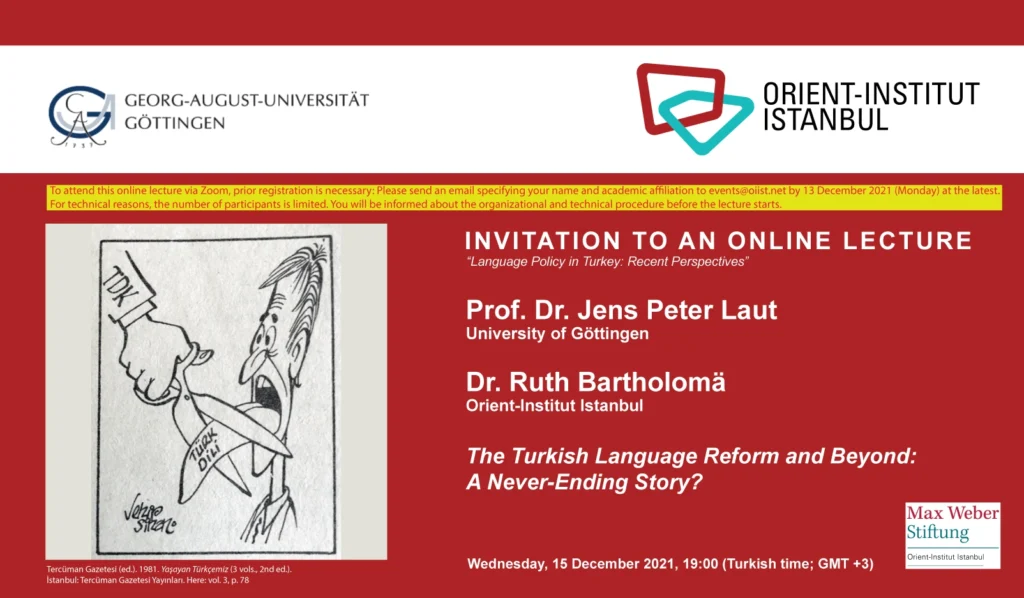
- Diese Veranstaltung hat bereits stattgefunden.
Language Policy in Turkey: Recent Perspectives – Prof. Dr. Jens Peter Laut, Dr. Ruth Bartholomä
Dezember 15, 2021@7:00 pm–9:00 pm

Abstract:
This talk presents a newly published edited volume about debates on language policy and planning in the Republic of Turkey. The eight chapters deal with various aspects related to both the official language Turkish and the other languages used in Turkey, whether autochthonous minority languages or languages that have recently become important through migration. For their analyses, the authors, coming from different disciplinary backgrounds like Turkology, political science or history, use methods like discourse analysis, mixed-method approaches or concepts from the field of linguistic landscapes research.
Topics include re-evaluations of the Turkish Language Reform of the 1920s and 1930s, analyses of debates concerning the Turkish language in connection with questions of gender, loanwords and use in political speeches, the language on public and private signs, demands raised in connection with the so-called “Democratic Opening” initiated in 2009 or the migration of refugees from Syria since 2011. Attention to current developments also provides new perspectives on the early phase of language policy in Turkey and the question whether such developments can be seen as continuities or discontinuities. In any case, this book makes an engaging contribution to what seems to be “a never-ending story”.
About the speakers:
Prof. Jens Peter Laut studied comparative religion, Turkish studies and Indian studies at the Universities of Marburg and Giessen. In 1980, he obtained his M.A. degree with a Master’s thesis on “Buddhist Ideas of Hell (with Special Reference to Old Turkish Texts)”. From 1980 until 1984, he was engaged in the project “Loanwords of Indic Origin in Old Turkish” at the University of Giessen. In February 1985, his dissertation in Turkish Studies on “The Uighur Text ‘Maitrisimit’ and Its Importance for the Early History of Turkish Buddhism” was accepted by the University of Giessen. From 1985 until 1988, he was engaged in a project at the University of Tübingen (“The Tübingen Atlas of the Middle East”, TAVO) and published two historical maps of the Ottoman Empire and a book on “Asia Minor in the 17th Century”. From June 1989 until December 1991, he received a post-doctoral scholarship from the DFG. He submitted his habilitation thesis on “Language Reform in Modern Turkey” in 1993 to the University of Göttingen. This degree was granted in November 1993. From 1996 to 2008, he was Professor of Islamic studies/Turkology at the University of Freiburg. Since October 2008, he has been Professor and Director of the Department of Turkology and Central Asian Studies at the University of Göttingen.
Dr. Ruth Bartholomä has been a research fellow at the Orient-Institut Istanbul since October 2019. She studied Islamic studies and Slavic studies at the University of Freiburg (Germany), spent one year at the University of Samarqand (Uzbekistan) and graduated from the University of Freiburg in 2005 with a thesis on the Hungarian Turkologist Arminius Vámbéry (1832–1913). In 2011, she received her PhD in Turkology from the University of Giessen (Germany) with a thesis on phenomena of language change in the lexis of the Tatar literary language between the end of the 19th and the beginning of the 21st centuries. From 2012 to 2014, she was interim professor for Islamic studies/Turkology at the University of Freiburg where she held the position of a “junior professor” from April 2014 to September 2019. Her research focuses on sociolinguistics. Currently she is conducting a research project on language policy and planning in the Republic of Turkey after 1980.